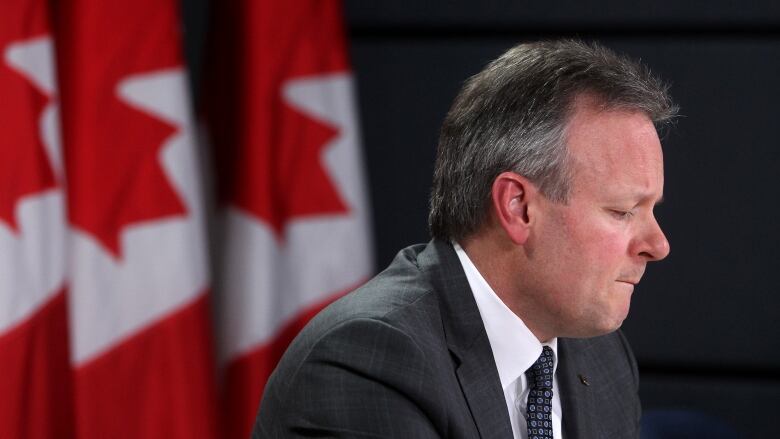Stephen Poloz keeps us guessing about economy: Don Pittis
Central banker making interest rate announcement Wednesday

It's hard to believe that we have waited almost seven years for the global economy to snap out of its funk.
As Bank of Canada Governor Stephen Poloz prepares to release his latest interest rate announcement later this morning, the optimists and the pessimists are lining up over whether to be gloomy or expect a boom.
So far, our chief central banker has slain the dragon of deflation by crossing his arms and whistling in other words, by doing nothing at all. And by all accounts, Poloz will adopt the same strategy today, keeping the central bank's interest rates unchanged at one per cent.
- How low will Canadian inflation go? Perhaps too low for comfort
- Stephen Poloz says low interest rates may be here to stay
- Stephen Poloz will be an economic party pooper at Bank of Canada: Don Pittis
By reading between the lines of the bank's written release today, everyone will be trying to figure out which side the governor is on. Does he see sunshine in our future or more of the same? Is Poloz a boomster or a gloomster?
Essentially, leaving interest rates the same is a vote on the gloomy side. That's because a change in favour of higher rates would mean the bank was expecting the smouldering North American economy to catch fire.
Canadian economists have repeatedly forecast higher rates, but those increases always seem to be over the next hill. In 2013, a Reuters poll of economists said the rate rise was coming at the end of 2014. A Report on Business headline earlier this week said, "Most economists expect a rate hike, probably in the second half of 2015." But no one ever seems to predict an increase in interest rates for the next bank statement.
Long-term optimism is good, but in the short term, you have to face reality. In 2013, Goldman Sachs chief economist Jan Hatzius bewailed the "repeated false starts of the past few years." That hasn't stopped him from staying on the side of the optimists. At the beginning of May, Goldman was predicting strong 3.5 per cent U.S. growth for the end of this year.
The link to U.S. economy
Pessimism also has its champions. The last bit of gloomy news came yesterday from the European Union, where inflation was a mere half a percent, dangerously close to scary deflation. And before that, the gloomy reality came from the U.S. economy. Not only did it fail to grow for the first three months. It actually shrank by one full percentage point.
Edward Luce at the Financial Post shows little respect for economic forecasters of any kind, comparing them to astrologers. But he scoffs at the idea that U.S. economic weakness was due to horrible winter weather, pointing out that it didn't stop the rich from shopping. He says the reason Canada's economy grew while the U.S. shrank was that Canada has a "more robust middle class." They have money and are recirculating it.
Having better income distribution may help, but the conventional wisdom is that Canada's economy is unlikely to take off if the U.S. stays moribund. Bank of Canada governor Poloz has lined up on the pessimistic side in the past, saying in April that interest rates were likely to stay low for the for the long term.
But as predecessor Mark Carney, who moved on to the Bank of England, has shown, even bank governors can be surprised. Despite being surrounded by a struggling, low-inflation Europe, the British economy has repeatedly exceeded Carney's expectations. Unemployment has plunged well below the bank's seven per cent target, growth is strong and house prices are going through the roof. Still, Carney is resisting pressure to raise rates.
On Friday, both Canada and the United States will get their next important economic indicator, when the jobless figures come out. Last month, Canada got a rude shock when the economy lost 29,000 jobs instead of gaining 13,500, as economists had predicted.
If Friday's jobs numbers show Canada is moving from gloom to boom, it will be good news everyone can celebrate. But it will mean that Stephen Poloz may have to stop whistling, and start thinking about the next dragon to slay.












_(720p).jpg)


 OFFICIAL HD MUSIC VIDEO.jpg)
.jpg)



























































































